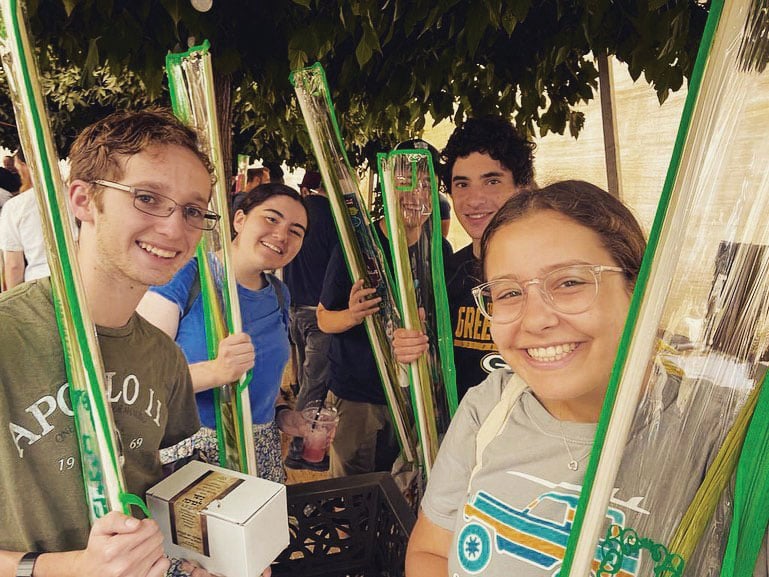 Photo courtesy of MASA Israel Journey Facebook page
Photo courtesy of MASA Israel Journey Facebook page At Shabbat tables across the country, many are asking: among younger Americans, is Jewish identity facing a recession?
A recent poll from Pew Research found that more than half of Jewish Americans between the ages of 18 and 29 say that they do not feel a strong connection to Israel.
In her youth, Charlene Green would have likely said the same thing.
“I was disconnected from my Jewish roots and felt something was missing from my life,” she said.
That changed when Green signed up for an immersive volunteer program in Israel with Masa Israel Journey, an organization that facilitates long-term study abroad programs in Israel for young Jewish adults from around the world. Today, nearly 15 years after her trip, Green works as a Jewish nonprofit professional at the Jewish Federations of North America.
“When I moved back to the United States, I knew I wanted to keep nurturing the part of my Jewish soul that blossomed in Israel,” she said. “This led me to find fulfilling employment building Jewish community in North America, sharing the passion and love of Judaism I discovered in Israel. I 100% attribute my lifelong work as a Jewish nonprofit professional to my Masa program.”
Last month, Masa released the findings of a study conducted by Impact:NPO that aggregated the personal attitudes and professional outcomes of thousands of its participants from 2009-2019, finding that Jewish individuals who spent a significant amount of time — defined as roughly four months or more — in Israel during their youth feel more connected as adults to the country and to Judaism.
The results, Masa CEO Ofer Gutman said, provide a quantitative explanation of a phenomenon that Masa has long understood.
“This study provides valuable data to support a conclusion that we have long understood: long-term immersive programs in Israel guide young Jewish adults to forge deep, lasting ties to the Jewish state, their Jewish identity, and the Jewish people,” said Gutman. “Even more exciting is that young Jews who have been unengaged from Jewish life before their long-term program, return to their homes with a desire not only to engage with their local Jewish communities but to meaningfully contribute.”
“Even more exciting is that young Jews who have been unengaged from Jewish life before their long-term program, return to their homes with a desire not only to engage with their local Jewish communities but to meaningfully contribute.”
– MASA CEO Ofer Gutman
The study divided American Jews between the ages of 20 and 45 into three groups: those that had spent more than four months living in Israel; those that had spent short periods of time in Israel; and those that had never been to Israel.
The report’s findings on the impact of long-term experiences in Israel on American Jewish identity was significant, the report claims. For example, eight-in-10 former long-term program participants surveyed in the inquiry said that being Jewish was an important part of their life, and 62% said they feel a strong connection to Jews in other parts of the world.
The report also highlighted the implications of experiences in Israel on the continuity of Jewish life and tradition. It found that nearly half of long-term program participants regularly donate to Jewish causes, and two-thirds participate in Jewish communal life. When it comes to parenting, 92% of long-term participants said they plan to raise their children in the Jewish community — more than 30 percentage points higher than those who had not spent significant time in Israel.
Masa said that in sharing the results of the survey, it sought to control for an important, confounding variable: Jewish affiliation and participation prior to coming to Israel. Masa alumni of Jewish Studies programs often begin their programs with deep connections to Jewish life, given their participation in early-age Jewish experiences such as summer camps, religious services, Jewish day schools and/or yeshiva programs. To ensure an even analysis of differences between surveyed groups, responses from Masa alumni of Jewish Studies were excluded from the report.
One group surveyed included Masa alumni that largely consists of millennials motivated to live in Israel to advance their careers. Nearly half of these individuals did not participate in formative Jewish experiences like summer camp, bar or bat mitzvahs, or day school as children, according to Masa.
Yet after spending time in Israel, the majority of this group felt strongly that being Jewish is an important part of their identity and indicated that they feel connected to the Israeli people, according to the study.
Gutman sees these findings as a great benefit to the Jewish people.
“Looking ahead, we now have concrete evidence of the transformative effect long-term programs in Israel has on young Jewish adults. Israel gains devoted advocates, Jewish communities gain engaged members, and collectively, the Jewish world gains leaders committed to cultivating a strong Jewish future,” said Gutman.





















 More news and opinions than at a Shabbat dinner, right in your inbox.
More news and opinions than at a Shabbat dinner, right in your inbox.